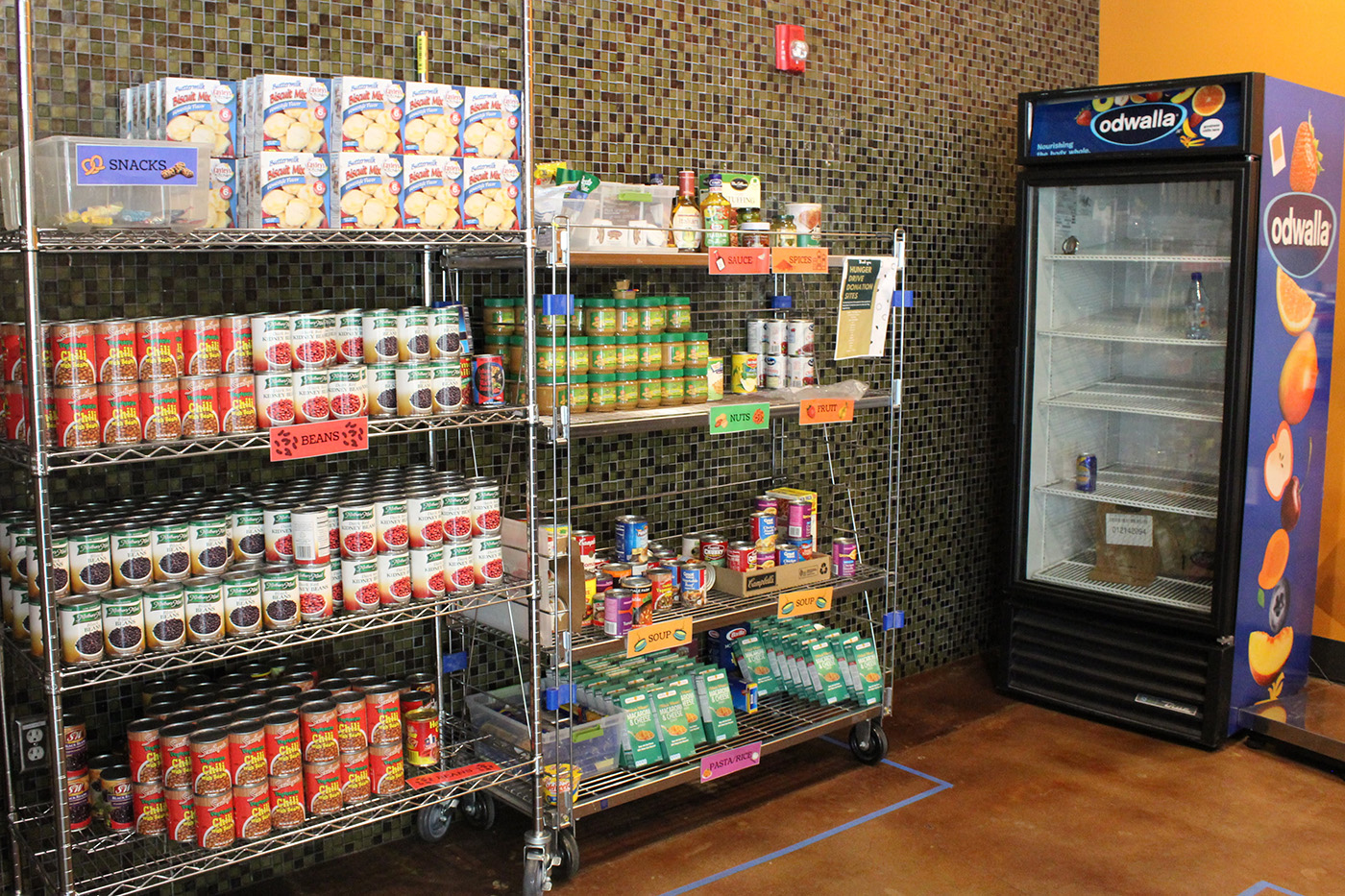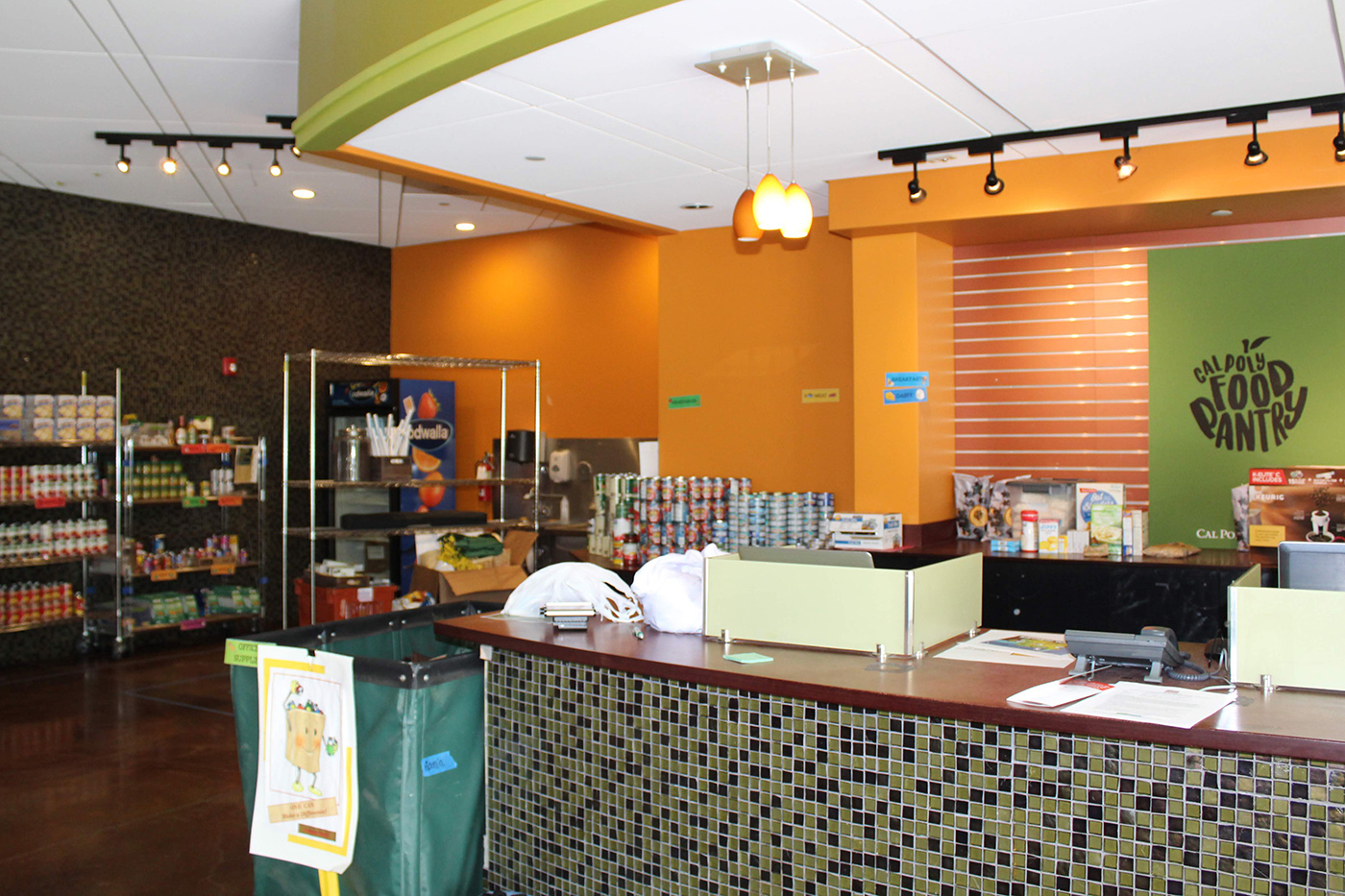White cage-like doors, dim lighting and narrow walkways that made students feel trapped in a corner — that was the Cal Poly Food Pantry before April 2019.
“It was literally just a cage, storage closet that was converted into a food pantry,” Director of Wellbeing and Health Education Genie Kim said.
One year after receiving a $130,000 grant from the California State University (CSU) system to help the 27 percent of Cal Poly students who do not know where their next meal is coming from, Campus Health and Wellbeing used part of the grant to renovate the original food pantry located in the Health Center to make it a more welcoming space for students. The grant was also used to open an additional food pantry location in Poly Canyon Village (PCV).
The original food pantry located in the Peers Understanding Listening Supporting Educating (PULSE) office below the Health Center opened its doors in Fall 2014 through donations from the Cal Poly Foundation.
According to Kim, prior to the renovation, the food pantry was not earthquake proof and did not meet Americans with Disabilities Act (ADA) standards for accessibility. Kim said that the main priority was to address compliance with earthquake codes, fire marshal codes and ADA accessibility. The food pantry was also renovated to make it appear more inviting to students.
“One of the things that we had heard … was there were some physical barriers of walking and feeling this weird sense that, ‘People were watching me,’” Kim said. “Now when you go into the space, it looks more like a mini market, which also de-stigmatizes the idea or concept of coming in for support or need if you’re food insecure.”
According to a Cal Poly Basic Needs Task Force Report conducted in Fall 2018, more than a quarter of Cal Poly students experience food insecurity, and these students reported “low” or “very low” food security. Students who are food insecure do not have reliable access to sufficient amounts of nutritious and affordable food.
An additional 26 percent of students experience “marginal” food security, meaning these students have consistent anxiety over food acquisition and have problems with food access. This means that approximately 6,000 Cal Poly students do not have regular access to food and another 6,000 students are on the brink of no access.

Tina Hadaway-Mellis is the Assistant Vice President for Student Affairs Health and Wellbeing, and in this role, she said she wants to ensure that students’ basic needs are met by increasing access to the food pantry.
“The easier access is, the more supported our students can be and the more students can be supported,” Hadaway-Mellis said.
Hadaway-Mellis said that taking that first step to utilize the food pantry might be scary, but she said she hopes the renovation will make the food pantry appear more welcoming for students.
“Asking for help is hard and some of us want to take care of it ourselves, but asking for help, I think, can be the bravest thing that anyone can do,” Hadaway-Mellis said.
There are varying levels of need, according to Kim, but she said the hope is that the renovation will help normalize access to the food pantry no matter the level of need.
Basic Need Health Equity Coordinator Emily Lu said many students often assume that there are other students who need the food pantry more than they do, leading them to not access the food pantry themselves.
“We have a campaign slogan, ‘If you think it, you need it,’” Lu said. “What we’re trying to do is to make it more acceptable for students to access resources without feeling shameful.”
Over the last five years, the food pantry has served about 1,500 students annually, according to Hadaway-Mellis. Students can access the food pantry on a “no questions asked” basis, meaning that students can take as much as they need. The food pantry offers food items such as canned beans and vegetables, pasta and rice in addition to fresh produce, toiletries, office supplies and even diapers for student parents.
It costs about $30,000 a year for the food pantry to operate, and the main supplier for the food pantry is the Food Bank Coalition of San Luis Obispo (SLO Food Bank). Private donors and donations through food drives also contribute to the maintenance of the food pantry. No student fees are associated with funding the food pantry.

Additionally, once a month, the SLO Food Bank holds a food distribution site on Mott Lawn where fresh produce and nonperishable items that come directly from the food bank are given out to students and community members.
The PCV Food Pantry located in the Aliso residence hall opened April 2019. Kim said the PCV location was identified to increase accessibility for students who live further from the food pantry located in the Health Center or the food distribution site on Mott Lawn.
“Many of the folks who were accessing the food distribution site had a very real physical barrier of taking three bags of groceries and walking all the way up to Poly Canyon Village,” Kim said.
Lu said that she hopes the additional food pantry in PCV will increase awareness of the resources available to students.
“Even though we are seeing an increase in the utilization of [the food pantry], it doesn’t nearly measure up to how many students are actually food insecure on campus,” Lu said. “One in four students are food insecure, and our numbers don’t show that utilization.
Lu said the additional PCV location enhances accessibility of the food pantry, but not having enough resources is not the problem. She said [Campus Health and Wellbeing] needs to work more on de-stigmatizing using the food pantry overall.
However, the PCV Food Pantry is still in its pilot stage. This means Campus Health and Wellbeing will assess the utilization of this food pantry site and determine its feasibility at the end of Spring quarter.
“We’re piloting it through the end of spring quarter to test whether or not [the PCV Food Pantry] is something that is actually beneficial for our students,” Kim said. “If it is, then we’ll definitely find a way to either expand hours or ensure we’re providing the resource for students on an ongoing basis.”
The PCV Food Pantry is open Tuesdays and Thursdays from 1-4 p.m., and it will remain open through the remainder of Spring 2019.
Moving forward, Hadaway-Mellis said she wants students to feel comfortable to go to the food pantry no matter what their need is.
“I would want [students] to know that we’re here for them,” Hadaway-Mellis said. “We’re going to do our part here to ensure that our students are supported.”
The grant Cal Poly received is a portion of $2.5 million that was provided to the CSU system with the passage of Senate Bill 85, which supports the CSU Basic Needs Initiative and designates all CSU campuses to be hunger-free. Awards were distributed across the 23 CSU campuses ranging from $40,000 to $155,000. All CSU campuses have a food pantry.

